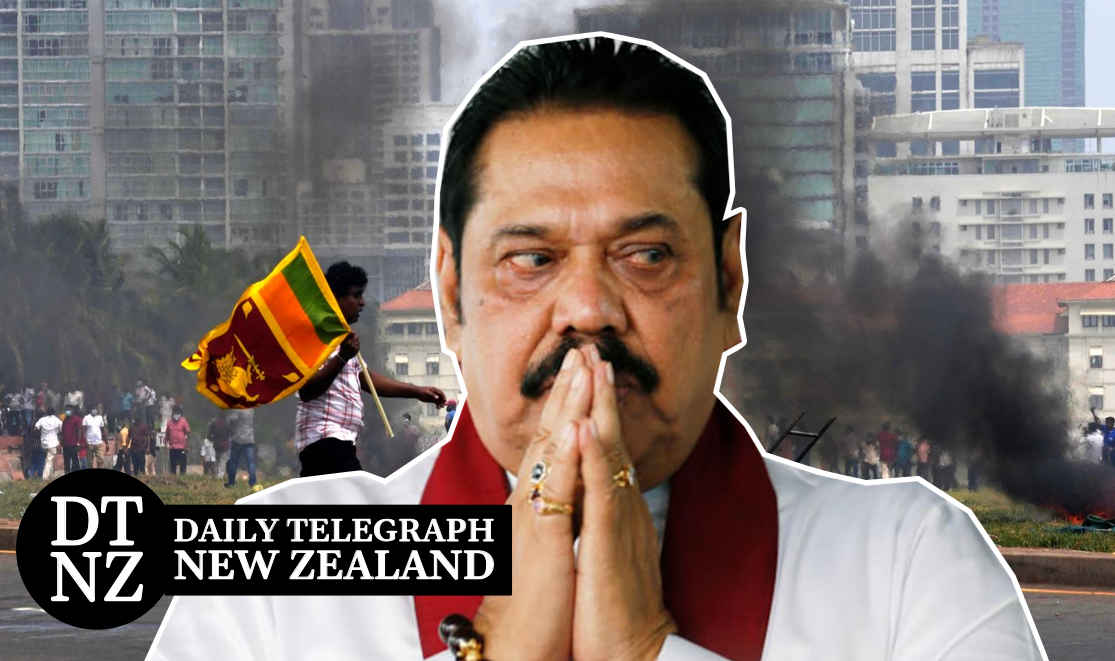
The Asian nation has been driven to near bankruptcy.
Sri Lankan Prime Minister Mahinda Rajapaska resigned on Monday after months of violent protests. The country has defaulted on its foreign debt payments and rationed fuel amid skyrocketing inflation that has plunged many of its citizens into poverty.
The PM handed his resignation to President Gotabaya Rajapaksa, his younger brother, according to multiple media reports. The resignation dissolved Rajapaska’s cabinet, which was only formed last month after all of the previous cabinet members resigned.
Sri Lanka has been rocked by more than two months of continuous protests, and this unrest continued on Monday. Shortly before Rajapaska’s resignation, pro- and anti-government demonstrators clashed outside government buildings in the capital of Colombo, and police used tear gas and water cannons to break up the melee.
Hundreds of armed soldiers were deployed in Colombo to quell the unrest, and a curfew was imposed. That curfew was broadly ignored, however, and at least 76 people were injured in Monday’s clashes, the Times of India reported. According to another report by AFP, a legislator from Rajapaska’s party was found dead on the outskirts of Colombo after he allegedly opened fire on protesters blocking his car.
Sri Lanka has experienced shortages of food, fuel and medicine in recent months, as inflation soared to nearly 30% in April. Fuel rationing was introduced last month, and long queues for staples such as rice, milk powder, and medical supplies were reported.
Rajapaska’s government announced in April that it would halt payments on its foreign debt, with Central Bank Governor Nandalal Weerasinghe explaining that the country had to use its dwindling reserves to import food and fuel instead. Sri Lanka was due to pay some $7 billion of its foreign debt this year, but Finance Minister Ali Sabry announced last week that the country’s reserves had fallen to below $50 million.
The financial and humanitarian crisis has been blamed by the government on the Covid-19 pandemic, which cut into the island nation’s revenue generated by tourism. However, high government spending and tax cuts also depleted state coffers, while attempts to pay off foreign bonds by increasing money printing led to skyrocketing inflation.
It is unclear whether Rajapaska’s resignation will calm aggrieved citizens. Trade unions on Monday called for a week of continued protests culminating in a march to parliament to demand that President Gotabaya Rajapaksa also step down, AP reported.
Huge corruption to blame. Here comes the IMF, we are all going to get cheap tea for years to come.
Mandating organic farming dropped food production by 40% might have something to do with this
references https://wattsupwiththat.com/2022/05/04/samantha-power-and-the-green-new-famine/
https://foreignpolicy.com/2022/03/05/sri-lanka-organic-farming-crisis/
https://modernfarmer.com/2022/03/sri-lanka-organic-experiment/
https://www.agweb.com/opinion/we-must-learn-sri-lankas-man-made-organic-agriculture-disaster
https://www.aljazeera.com/news/2022/1/26/sri-lanka-200-million-compensation-farmers-organic-crops-drive
good links – the true cause of these issues is hidden in green agendas and the growing obviousness of politicians incompetence. NZ is on the same path blindly importing coal while our own mines are shut. We still export some coal but local consumption has been strangled. Biomass is hailed as the solution but look deeper and you will see that it is not being made from slash but useful lumber.
The green strategies are so dishonest they cant stand any scrutiny and are actively being hidden to maintain the illusion of greenness. How green is it to import coal and use valuable timber as a replacement? Building products shortage anyone??
You are next Jabcinda pack your bags and leave NewZealand,you have done huge damage to our country.